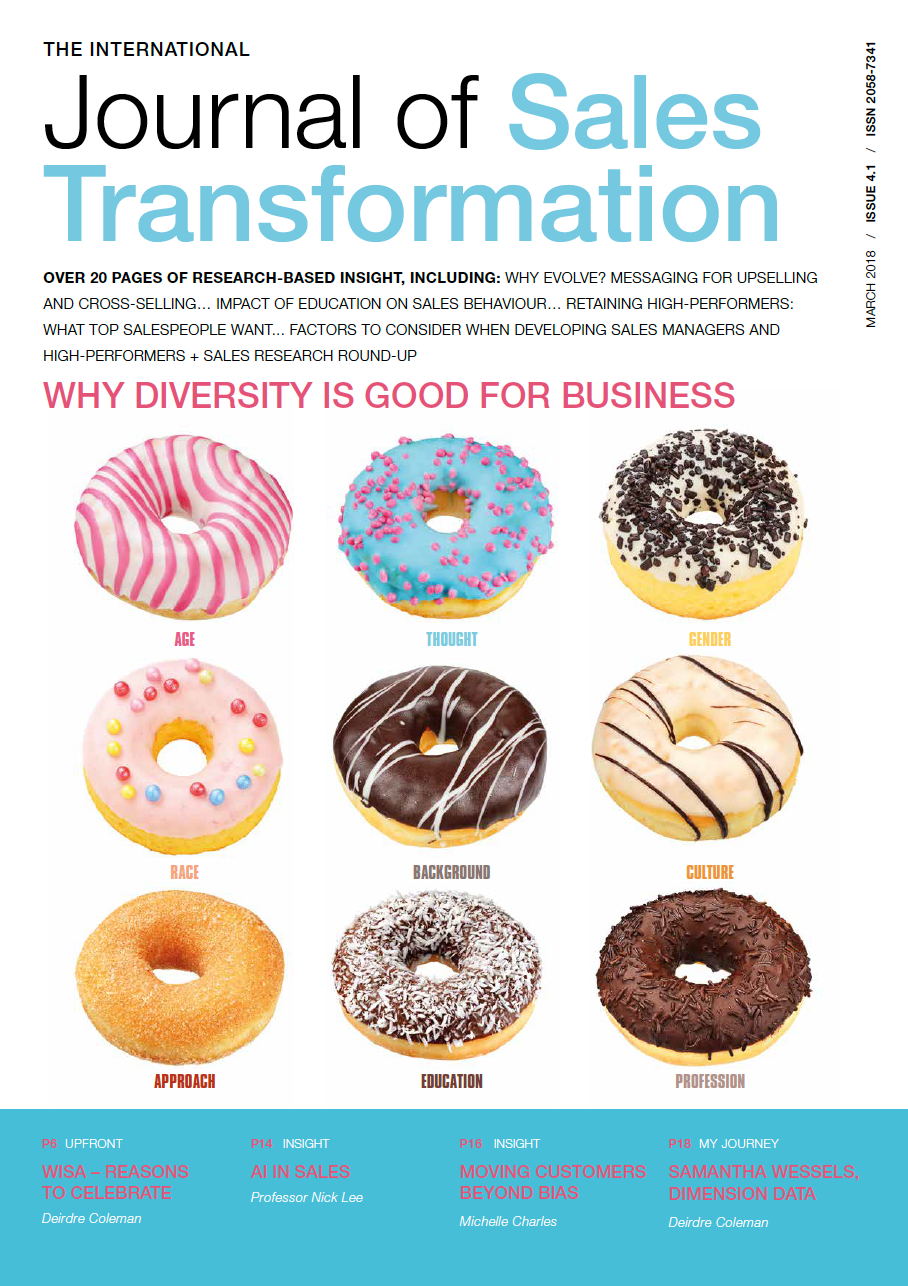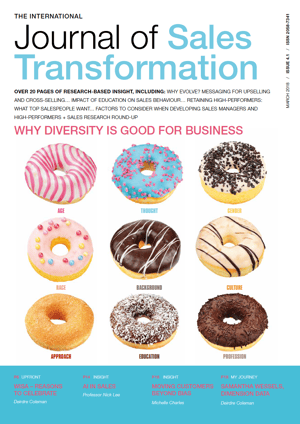The many dimensions of diversity in B2B sales
March 15, 2018

 If - as many scale-ups are - you are on a mission to challenge the status quo and get your prospective customers to think differently about their critical business issues, you would be wise to ensure that you are accommodating diverse perspectives and experiences within your own organisation.
If - as many scale-ups are - you are on a mission to challenge the status quo and get your prospective customers to think differently about their critical business issues, you would be wise to ensure that you are accommodating diverse perspectives and experiences within your own organisation.
I’m not talking about the conventional demographic dimensions of diversity - of age, sex, race, religion or the like - but about encouraging diversity in the way your teams think about the issues, challenges and opportunities that your organisation is facing both now and in the future.
The world in which we are competing is changing far too fast for organisations to embrace a Taylorist “One Best Way” approach that assumes that rigid thinking or standardised processes are capable of delivering anything close to an optimal outcome.
Embracing this broader-based diversity mindset starts (or ought to) with our hiring processes. In an increasingly dynamic world, hiring primarily or exclusively on the basis of prior experience seems to be an increasingly ineffective strategy, as evidenced by the number of sales leaders who have come to regret hiring someone who appeared to be a superstar when working for a direct competitor, only to fall far below expectations in their new role.
Thanking specifically of the complex B2B sales roles with which I am most familiar, attitude, aptitude, creativity, curiosity and the willingness to embrace new ideas have seemed to be far more effective predictors of long-term success than experience alone - and this allows us to consider a far larger potential talent pool.
Having attracted the right mix of talent, we need to make sure that we don’t stifle their potential by restricting them within inflexible systems or processes that suppress their creativity or their ability to come up with fresh perspectives.
When managing sales organisations that are competing in a complex buying environment, we need to think of our processes as skeletons rather than cages, as catalysts for creativity and as guides rather than mechanisms for enforcing a centrally dictated and often outdated “perfect world” view of how things ought to be done.
In times of change, learning from the centre is inevitably an inadequate strategy. We need to tap in to the real-time, real-world, diverse experiences of the people who are operating at the edges of our organisation: at the interfaces between our company and our customers.
This is where the real learning is going on: and our best, most creative sales people are working out new solutions to new challenges in every significant customer interaction. We can’t afford to waste these invaluable lessons by confining them to the individuals who happened to discover or experience them.
Of course, sales leaders need to promulgate winning habits - but many of these winning habits are inevitably shaped by recent experiences at the edge. As sales leaders we need to be continually challenging our teams to think differently, to share positive and negative experiences and to collectively come up with better ways of applying this knowledge.
This ability to accommodate and harness diversity of thought can of course differ significantly between both companies and industries and often starts to become constricted as organisations progress from the start-up phase through the scale-up phase towards becoming an established corporate.
If my experiences are anything to go by, there is an increasing risk of group-think and acceptance of the status quo as organisations grow and put systems in place - until some sort of shock to those systems causes them to recognise what has apparently worked well for them in the recent past is now unlikely to allow them to get where they now need to go.
If we are foolish enough to allow diversity of thought atrophy through neglect or the desire to “behave more like a corporate”, we’ll find it hard to restore it on a whim. It’s surely better for us to think of diversity of thought and behaviour as a muscle that needs to be continuously exercised.
Let’s not allow it to waste away!
An earlier version of this article was originally published in the March 2018 Edition of the International Journal of Sales Transformation.
IF YOU LIKED THIS, YOU'LL PROBABLY ALSO APPRECIATE:
BLOG: Sales training: should we emphasise technique or thinking?
BLOG: The issue with generic "unique value propositions"
BLOG: Discovery- the foundation of B2B sales success
BLOG: Are your sales people leading with gain or pain?
BLOG: Encouraging our sales people to think
BLOG: Are you selling "me-too" or "breakthrough"?
BLOG: Situational awareness - a critical factor in B2B sales
BLOG: Self-awareness and self-honesty in complex B2B sales
ABOUT THE AUTHOR
 Bob Apollo is a Fellow of the Association of Professional Sales and the founder of UK-based Inflexion-Point Strategy Partners, home of the Value Selling System®. Following a successful career spanning start-ups, scale-ups and corporates, Bob now works with a growing client base of tech-based B2B-focused high-growth businesses, enabling them to progressively create, capture and confirm their unique value in every customer interaction.
Bob Apollo is a Fellow of the Association of Professional Sales and the founder of UK-based Inflexion-Point Strategy Partners, home of the Value Selling System®. Following a successful career spanning start-ups, scale-ups and corporates, Bob now works with a growing client base of tech-based B2B-focused high-growth businesses, enabling them to progressively create, capture and confirm their unique value in every customer interaction.


Comments